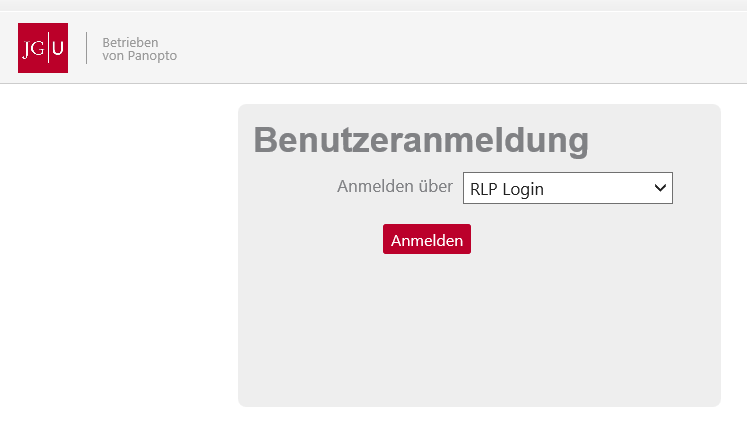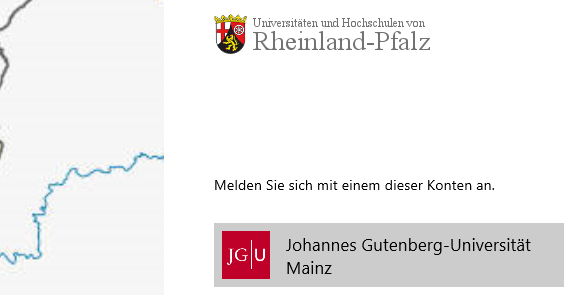To promote video-based teaching, the Center for Data Processing at the University of Mainz provides the server infrastructure for the Panopto video platform, which is available free of charge to all universities in Rhineland-Palatinate at https://video.uni-mainz.de. Panopto is a web-based application for publishing, providing and editing videos.
Panopto is a web-based application for publishing, providing and editing videos. To create videos, the associated Panopto Recorder is available as downloadable software for your own PC or Mac for recording webcasts or live streams.
View Videos
In order to view videos provided on Panopto, you must log in in most cases - even if you have a link to the video, because permissions are often restricted to members of a university or participants in a specific course.
If you experience problems watching videos, always check that you have logged in correctly first: On the https://video.uni-mainz.de page, select RLP Login and then your institution. JGU students thus select JGU and log in with the JGU account.
Insbesondere bei Verwendung von Safari treten häufig Probleme beim Ansehen von Videos auf, die in Kurse eingebunden sind. Lösungsmöglichkeiten finden Sie auf der folgenden Seite:
Provide your own Videos
Students can also create and publish videos in Panopto. To do so, however, it is necessary to obtain creator permissions for a folder from a lecturer. Only then is it possible to actively use Panopto (to create/publish videos) with a student JGU account. There is no further/additional activation of the student account by the ZDV for student accounts. If you want to use the Panopto-Recorder for recording, you have to download and install it - after you have received creator permissions.
Scientific assistants
Students working as research assistants use their Hiwi- and not their student JGU-account and then proceed analogous to the description for lecturers. We recommend the use of a Hiwi account.
If research assistants are to work with their student JGU account, the supervisor must create a folder in Panopto and assign creator permissions.
To be able to create videos, you first need a personal folder in Panopto. If you want to use Panopto recorder for recording, you need to download and install it - after the personal folder is created.
- You can check yourself if you already have a personal folder in Panopto: Log in at https://video.uni-mainz.de with your JGU account (select "RLP Login"). If you see a folder named "My folder" in the left column after logging in, you do not need to do anything else.
- If the folder "My folder" is not displayed:
If you are offering content from any course as a course in Moodle: Include the Panopto block in Moodle as described here:
https://www.elearning.uni-mainz.de/videos-in-moodle-von-panopto-einbinden
This will automatically create the personal folder right away.Once you do that, you will have a personal folder in Panopto and thus creator permission for your own video content. Nothing more is needed. - If you don't have a personal folder yet and no way to create a course in Moodle to add the Panopto block there once, you can send us the following form. We will then create your personal folder manually.
> Link to the form
For long-term, non-personal projects that are to be worked on jointly, it is in principle possible to use a shared project folder in Panopto.
In order to avoid that resources are subsequently burdened by orphaned projects, please check first whether it might be possible to use an already existing folder - in principle, it is always possible to give other people creator permission on a folder below the personal folder and often this procedure is sufficient. If this possibility is out of question, please send us the following form. Please note that at least two JGU accounts must always be authorized. For jointly created materials, also remember to clarify copyrights. Consider what should happen to the content if an author leaves the institution.
Further hints
- Panopto is a web application and easy to use in the browser!
- Login with the JGU account at video.uni-mainz.de (select RLP login!).
- Record video content with the downloadable software for Windows PCs and Macs (PanoptoRecorder)
- Upload, manage and share videos in your own or shared folders
- Integrating videos into learning management systems (ILIAS, Moodle)
Existing videos can also be uploaded to Panopto. For example, videos that were previously made available via the old streaming server and that can then be played again via Panopto using current end devices.
Further details and links to the relevant pages and documents are listed below.
In this tutorial video you will learn how to install the Panopto recorder on a domain computer.
You can log in over the following address: https://video.uni-mainz.de/Panopto/
Please select 'Login via RLP Login' in the next step:

Then click on 'Johannes Gutenberg-Universität Mainz' in the account selection:

How to save Panopto videos locally and connect files in Panopto is explained in our detailed instructions.
If you would like to offer your videos in ILIAS or Moodle courses, please see our documentation on embedding and embedding educational videos in ILIAS and Moodle.
Embedding in WordPress pages and in the survey system LimeSurvey is also possible. Videos already recorded with other systems can be uploaded to Panopto just as quickly and easily; regardless of the previous format, videos embedded in this way can be played on almost all end devices.
If you are planning an event recording, please contact the Center for Audiovisual Production. For more information, please visit the event recording information page.
The Center is available to assist all university institutions with consultation, technology, and the production of audiovisual media content.
Furthermore, the VCRP offers very comprehensive material on the topic of e-lectures. It addresses didactic and legal issues, describes various scenarios and provides helpful practical tips.
There is a Panopto app for smartphones that lets you conveniently access your videos on the go. Videos recorded with the smartphone can also be uploaded effortlessly.
Download for Android
Download for iOS
It is possible to create videos and upload them to Panopto. You can find detailed instructions and more details here.
The Virtual Campus Rhineland-Palatinate (VCRP) provides individual institutions with
- information and activities about the Video Server RLP (Panopto) and the use of learning videos in university teaching within the framework of a video community.
- The VCRP E-Academy complements the offer with online tutorials and expert chats.
The Digital Teaching Competence Team at JGU can also help you with application questions:
- Please visit the website Digital Teaching
- or contact them directly at: digitale-lehre@uni-mainz.de
For general questions about the Video-Server RLP you can contact the support of the VCRP. If, on the other hand, you would like to request Panopto use for your event, please use the form provided.
If you would like to discuss with other teachers about the use of educational video at universities in RLP, or if you have specific questions about the Video-Server RLP, you will find what you are looking for in the support forums.
Further assistance is offered by the video platform Panopto itself.
The Panopto application combines many advantages:
- The videos can be played on any end device
- The videos are stored on servers of the University of Mainz
- Access can be controlled individually
- Access statistics are available
- The videos are uploaded in Panopto and not in the LMS - so the courses in ILIAS and Moodle remain more compact.
ADVANTAGES FOR TEACHERS
- Recording of presentations lectures or elaborate experimental setups
- More time for deepening the content in the course
- Accessibility of students outside the lecture hall through podcasts
- Location-independent online discussions via webcast
- Testing of innovative teaching methods
ADVANTAGES FOR STUDENTS
- Reception and repetition of content at their own learning pace
- Increase of media competence
- Flexible access to course content in terms of time and location
- Independent creation of web content
💡 We have compiled the most important information for you in a factsheet.
